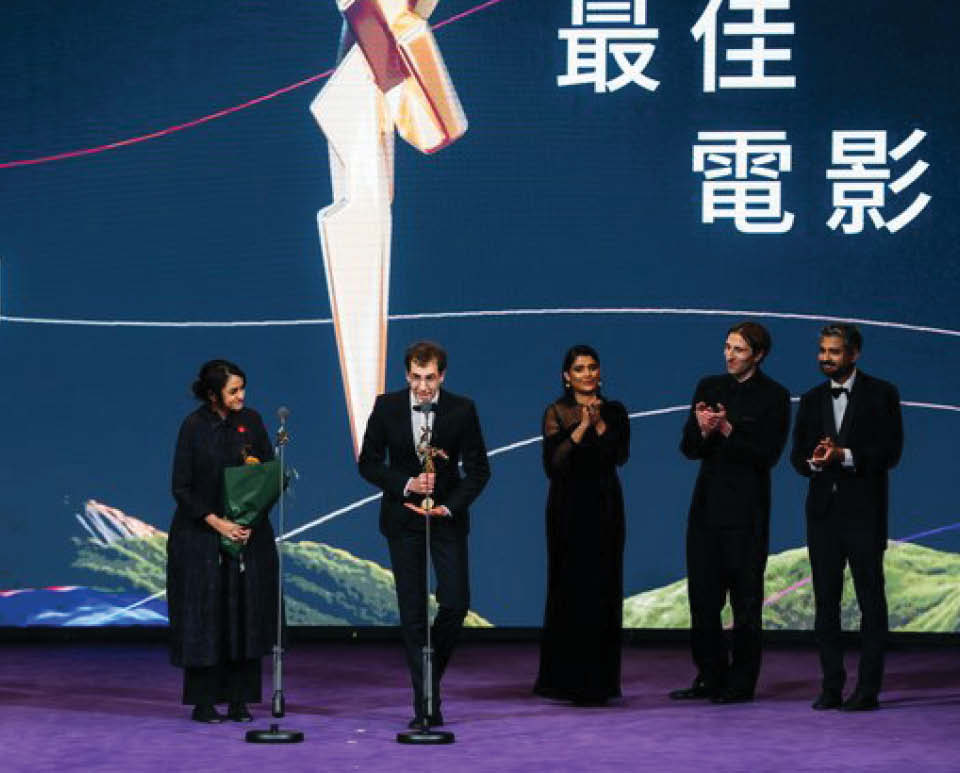
“All We Imagine as Light”, the Indian-European co-production which picked up the runner-up prize in Cannes last year, was named as the best film today (Sunday, 17 March) at the 18th Asian Film Awards (AFA) in Hong Kong. But it was a modest recompense for the art-house hit’s six AFA nominations on an evening which skewed heavily towards East Asia’s dominant movie-making territories – Japan, South Korea, Hong Kong and Taiwan.
Directed by former documentary-maker Payal Kapadia, “All We Imagine as Light” is a quiet and deeply humane tale of migrant women supporting each other in the rough and tumble of Mumbai. It was controversially overlooked by India for Oscars consideration. But it has won dozens of other honours, including the jury grand prize at the Asia Pacific Screen Awards.
Hong Kong claimed prizes with three different films, two box office record breakers “The Last Dance” and “Twilight of the Warriors: Walled In” as well as the painfully controversial abuse drama “Papa", which won Sean Lau Ching-wan the award for Best Actor.
In November, Yoshida Daihachi was the no-contest winner at the Tokyo film festival with his brooding art house drama “Teki Cometh.” And his receipt of the AFA best director always seemed a probability.
“Happyend,” by U.S.-based Japanese director Neo Sora and an honorary award for “Perfect Days” actor Yakusho Koji expanded Japan’s total.
Korean hits “Exhuma” and “Harbin” earned three of the competitive prizes, including best cinematography (Hong Kyeong-pyo for “Harbin”). Best costume design went to Choi Yoon-sun for “Exhuma”, which also won best visual effects for Kim Shin-chul and Daniel Son.
For Taiwan, “Yen and Ai Lee” picked up one award for best supporting actress for Yang Kuei-Mei, and crafts folk and iconic actor Lee Kang-sheng won best supporting actor for multinational Singapore-set surveillance thriller “Stranger Eyes", which also won best soun...
“All We Imagine as Light”, the Indian-European co-production which picked up the runner-up prize in Cannes last year, was named as the best film today (Sunday, 17 March) at the 18th Asian Film Awards (AFA) in Hong Kong. But it was a modest recompense for the art-house hit’s six AFA nominations on an evening which skewed heavily towards East Asia’s dominant movie-making territories – Japan, South Korea, Hong Kong and Taiwan.
Directed by former documentary-maker Payal Kapadia, “All We Imagine as Light” is a quiet and deeply humane tale of migrant women supporting each other in the rough and tumble of Mumbai. It was controversially overlooked by India for Oscars consideration. But it has won dozens of other honours, including the jury grand prize at the Asia Pacific Screen Awards.
Hong Kong claimed prizes with three different films, two box office record breakers “The Last Dance” and “Twilight of the Warriors: Walled In” as well as the painfully controversial abuse drama “Papa", which won Sean Lau Ching-wan the award for Best Actor.
In November, Yoshida Daihachi was the no-contest winner at the Tokyo film festival with his brooding art house drama “Teki Cometh.” And his receipt of the AFA best director always seemed a probability.
“Happyend,” by U.S.-based Japanese director Neo Sora and an honorary award for “Perfect Days” actor Yakusho Koji expanded Japan’s total.
Korean hits “Exhuma” and “Harbin” earned three of the competitive prizes, including best cinematography (Hong Kyeong-pyo for “Harbin”). Best costume design went to Choi Yoon-sun for “Exhuma”, which also won best visual effects for Kim Shin-chul and Daniel Son.
For Taiwan, “Yen and Ai Lee” picked up one award for best supporting actress for Yang Kuei-Mei, and crafts folk and iconic actor Lee Kang-sheng won best supporting actor for multinational Singapore-set surveillance thriller “Stranger Eyes", which also won best sound design for Tu Duu-Chih and Tu Tse-Kang.
“The Seed of the Sacred Fig,” which flew a German flag in the Oscars race, earned a best screenplay award for its Iranian writer-director Mohammad Rasoulof who defied authorities to present the picture at Cannes last year.
“Santosh”, which represented the U.K. as an Oscars contender, earned two significant prizes for Shahana Goswami as best actress and Sandhya Suri as best new director.
Somewhat less imaginatively, the excellence in Asian Cinema awards and the rising star award also went to talents from developed Northeast Asia – to Korea-based Chinese actress Tang Wei and Korean heartthrob Jang Dong-gun, and to Japanese model-turned-actress Kokim.
Incongruously, established Taiwan star Wu Kang-ren, was given the AFA’s Next Generation Award.
The clustering meant that some of Asia’s most headline-making films of 2024 from smaller territories went unrewarded. These included banned art house gem “Viet and Nam”; Cambodian veteran Rithy Panh’s “Meeting with Pol Pot”; and Thailand’s international hit film “How to Make Millions Before Grandma Dies.” Chinese director Guan Hu’s hypnotic “Black Dog” can also count itself unlucky to come away empty handed after five AFA nominations (and a major award in Cannes). – By Patrick Frater


















